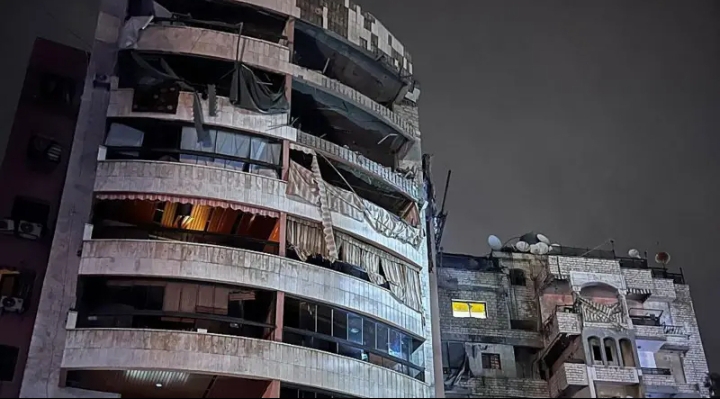An Israeli air strike on Beirut killed four people, escalating tensions with Hezbollah despite a ceasefire. Israel targeted a Hezbollah operative linked to Hamas, while Lebanon condemned the attack as a violation. The conflict has led to ongoing Israeli strikes and Hezbollah resistance, with thousands killed and displaced.
Four Killed in Israeli Strike on Beirut, Lebanon Says, Despite Ceasefire


An Israeli air strike on Beirut's southern suburbs has resulted in the deaths of four people, according to Lebanon's health ministry. The attack has further strained an already fragile ceasefire between Israel and the Lebanese armed group Hezbollah.
In addition to the fatalities, seven individuals sustained injuries in the strike, as confirmed by the health ministry. This marks the second attack on the Dahieh area, a Hezbollah stronghold, within recent days—despite a truce that was established in November.
The Israeli military stated that the strike was aimed at a Hezbollah operative who had played a role in assisting Hamas in planning an attack against Israeli civilians. However, there has been no immediate response from Hezbollah regarding the incident.
Lebanon's President Joseph Aoun strongly condemned the strike, describing it as a dangerous escalation. Similarly, Lebanese Prime Minister Nawaf Salam denounced the attack, calling it a "flagrant violation" of the ceasefire agreement.
The airstrike occurred in the middle of the night without prior warning. Images from the scene reveal significant damage to the top three floors of an apartment building, illustrating the force of the impact.
In a joint statement, the Israel Defense Forces (IDF) and Israel Security Agency (ISA) confirmed their involvement in the attack, stating that the military had conducted a targeted strike in Dahieh. According to the Israeli military, the operation successfully eliminated Hezbollah operative Hassan Ali Mahmoud Bdeir, who had "recently directed Hamas operatives and assisted them in planning a significant and imminent terror attack against Israeli civilians." The military justified its actions by emphasizing the "immediate threat" posed by Bdeir and indicated that it would continue to carry out similar operations in Lebanon if necessary.
Lebanon's health ministry confirmed that four people lost their lives in the attack, including one woman.
This strike follows another Israeli assault on Beirut last Friday—the first since the ceasefire was put in place—bringing an end to over 13 months of conflict with Hezbollah, an Iranian-backed militia and political entity. In that previous operation, the Israeli military claimed to have targeted a Hezbollah drone storage facility in response to two rockets fired from southern Lebanon towards northern Israel.
Hezbollah denied involvement in the rocket attack and reiterated its commitment to the ceasefire. No other armed group has taken responsibility for the rocket launches.
Despite the ceasefire agreement, Israel has continued to conduct near-daily air strikes against individuals and targets it identifies as linked to Hezbollah. Israeli authorities argue that these strikes are necessary to prevent Hezbollah from rearming. However, Lebanon's government contends that such attacks—along with the continued presence of Israeli soldiers in five locations in southern Lebanon—are clear violations of the ceasefire.
Hezbollah initially launched its campaign the day after the Hamas-led attacks on southern Israel on October 7, 2023, asserting that its actions were in solidarity with Palestinians in the Gaza Strip.
This escalation led to an intense Israeli aerial campaign across Lebanon, coupled with a ground invasion of the country’s southern region. The offensive resulted in approximately 4,000 deaths in Lebanon, including a significant number of civilians, and forced the displacement of over 1.2 million residents.
Israel's official objective in its conflict with Hezbollah was to facilitate the return of approximately 60,000 Israeli residents who had been displaced from northern communities due to Hezbollah's attacks. Additionally, Israel sought to push Hezbollah forces away from the border region.

 বাংলা
বাংলা  Spanish
Spanish  Arabic
Arabic  French
French  Chinese
Chinese 
